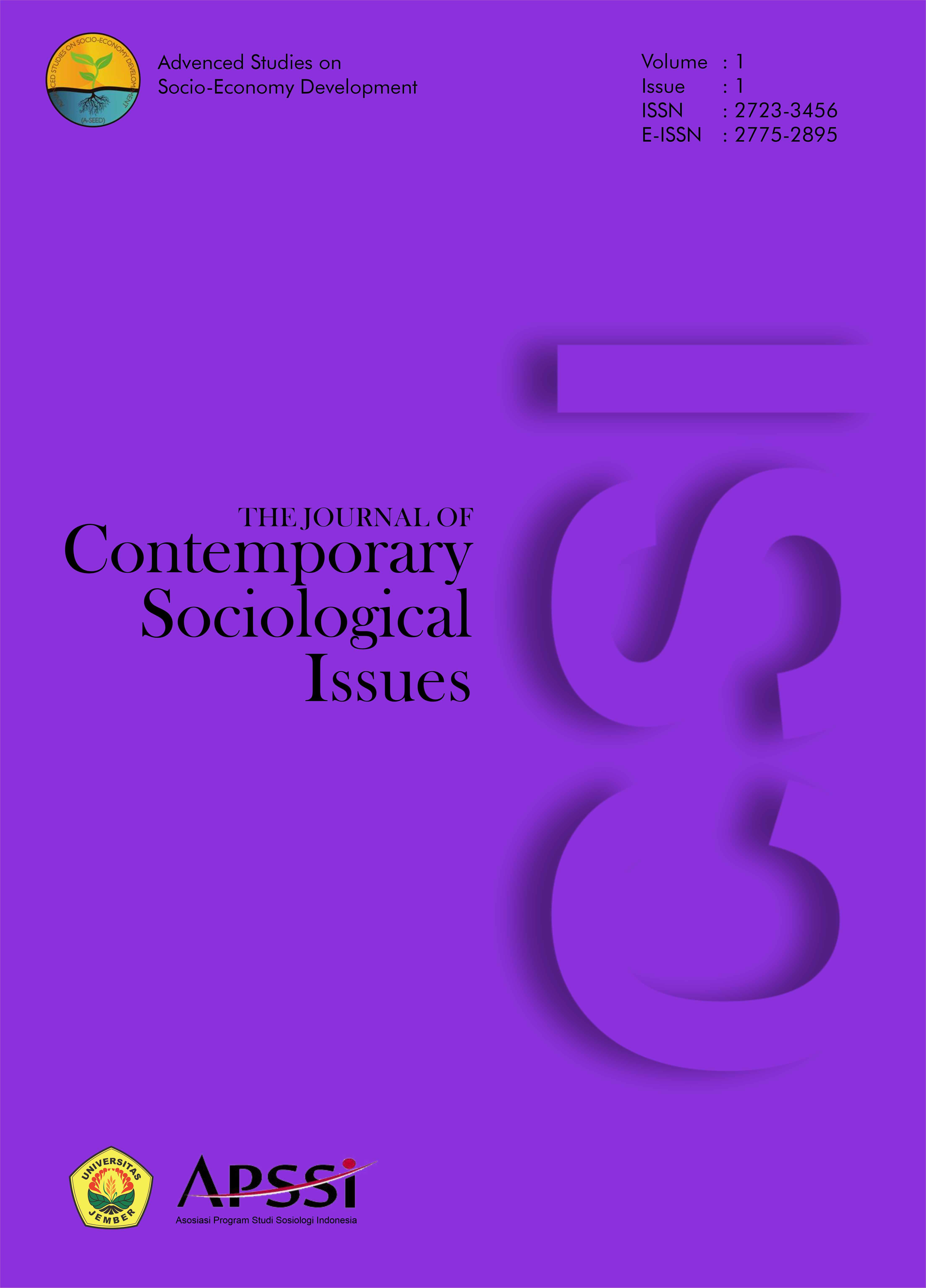Consuming Leisure Time
How The Tourism Trend Has Changed the Village
DOI:
https://doi.org/10.19184/csi.v1i1.19803Keywords:
Tourism Transformation, Village, Leisure, Space ConsumptionAbstract
This article explores the concept of leisure time and its connections to trends in tourism. Examining the specific implications of tourist agendas on previously ‘rural’ villages, this study demonstrates how the tourist agenda has shaped leisure time and contributed to the transformation of places into more commercial, tourist hubs, aiming to maximize consumer attraction. Crucially, new economic features associated with the tourism trade have altered social relations and dynamics in rural areas. These changes can also be seen in Yogyakarta, especially villages in the Sleman area. This study uses qualitative methods to explore the economic changes experienced within the village associated with its formation as a tourist destination, drawing on observational and secondary data sets. Changes in economic patterns, generally, cannot be separated from the tourism trend. In this article, tourism trend refers to consumer market which emphasizing the modification of classical nuances which refers to the proliferation of restaurants and cafes in rural areas at Sleman. This study argues that the tourism trend in rural areas has not only changed their economic complexion but has also highlighted the character of the village as a space for urban community consumption. The economic shift from the expansion of the tourism sector is assumed to be able to contribute to development of rural areas. However, it is not necessarily possible to realize that sustainable regional development demand creativity to compete with the emergence of new entertainment venues.
Keywords: Tourism Transformation, Village, Leisure, Space Consumption.
Downloads
References
Bungin (Ed), Burhan. Analisis Data Penelitian Kualitatif. [Qualitative Research Data Analysis] Jakarta: Raja Grafindo Persada, 2010.
Coffee, Otten. “‘PIKNIK’ DI WARUNG KOPI KLOTOK YOGYAKARTA.†[PIKNIK 'AT THE KOPI CLOTHES, YOGYAKARTA] Majalah Otten Coffee (blog), 19 Oktober 2017. https://majalah.ottencoffee.co.id/piknik-di-warung-kopi-klotok-yogyakarta/.
Damanik, Janianton. Pariwisata Indonesia: Antara Peluang dan Tantangan. [Indonesian Tourism: Between Opportunities and Challenges]Yogyakarta: Pustaka Pelajar, 2013.
Dewi, Jannisha Rosmana. “Serah Terima Jabatan, Wishnutama Siap Sinergikan Ekonomi Kreatif dan Pariwisata.â€[Handover of Position, Wishnutama Ready to Synergize Creative Economy and Tourism] Badan Ekonomi Kreatif (blog), 24 Oktober 2019. https://www.bekraf.go.id/berita/page/8/serah-terima-jabatan-wishnutama-siap-sinergikan-ekonomi-kreatif-dan-pariwisata.
Dewi, Machya Astuti, dan Sri Issundari. “Desa Wisata Sebagai Aset Soft Power Indonesiaâ€[ Tourism Village as Indonesia's Soft Power Asset] 29, no. 02 (2016): 64–74.
Drucker, Peter. F. Innovation and Entrepreneurship: Practice and Principle. California: Perfect Bound, 1984.
Fatiya, Fatiya. “7 Tempat Makan dengan View Sawah Paling Adem di Jogja, Bikin Betah.,â€[ 7 Places to Eat with the Coolest Rice Field View in Jogja, Make You Feel Good] 1 Juli 2018. https://www.idntimes.com/food/dining-guide/fatiya-1/7-tempat-makan-dengan-view-sawah-paling-adem-di-jogja-bikin-betah-c1c2/full.
Hamzah, Faizal, Hary Hermawan, dan Wigati Wigati. “Evaluasi Dampak Pariwisata Terhadap Sosial Ekonomi Masyarakat Lokal.†[Evaluation of the Impact of Tourism on the Socio-Economic of Local Communities] Jurnal Pariwisata 5, no. 3 (14 Oktober 2018): 195–202. https://doi.org/10.31311/par.v5i3.4434.
Idrus, Muhammad. Metode Penelitian Ilmu Sosial. [Social Science Research Methods] Jakarta: Erlangga, 2009.
Istriyani, Ratna. “Kontribusi Pemuda dalam Menjawab Permasalahan Sosial Ekonomi Pascabencana.†[Contribution of Youth in Responding to Post-Disaster Socio-Economic Problems] Jurnal Studi Pemuda 4, no. 2 (9 Agustus 2018): 315–29. https://doi.org/10.22146/studipemudaugm.36815.
Koentjaraningrat, Koentjaraningrat. Masyarakat Desa di Indonesia. [Village Communities in Indonesia] Jakarta: Fakultas Ekonomi Universitas Indonesia, 1984.
Marx, Karl. Filsafat Kemiskinan. Terjemahan Oey Hay Djoen[Poverty Philosophy. Oey Hay Djoen's translation]. Dey’s Renaissance, 2007.
Muljadi, Muljadi. Kepariwisataan Dan Perjalanan. [Tourism and Travel] Jakarta: Raja Grafindo Persada, 2010.
Muslimah, Anggita. “Prediksi Tren Wisata Turis Indonesia Tahun 2019,â€[ Predictions of Indonesian Tourist Trends in 2019] 18 November 2018. https://travel.kompas.com/read/2018/11/18/113944027/prediksi-tren-wisata-turis-indonesia-tahun-2019.
Neuman, W. Lawrence. Metodologi Penelitian Sosial: Pendekatan Kualitatif dan Kuantitatif. [Social Research Methodology: Qualitative and Quantitative Approaches] Jakarta: Indeks, 2013.
Pambudi, dkk, Christina. “Waktu Luang dan Dinamika Kepariwisataan,â€[ Free Time and Tourism Dynamics] 9 September 2019. https://crateridea.blog.uns.ac.id/2016/09/09/waktu-luang-dan-dinamika-kepariwisataan/.
Redaksi Retas, Redaksi Retas. “Memperkuat Komunitas, agar Monetisasi Terus Menerabas.†[Strengthening the Community, so that Monetization Continues to Serve] Retas, Desember 2016.
Ritzer, Goerge. Teori Sosial Postmodern. Terjemahan Muhammad Taufik.[ Postmodern Social Theory. Muhammad Taufik's translation] Yogyakarta: Kreasi Wacana, 2010.
Tim Penyusun, Tim Penyusun. Statistik Kepariwisataan 2018. [Tourism Statistics 2018] Yogyakarta: Dinas Pariwisata Daerah Istimewa Yogyakarta, 2018.
Veblen, Thorstein. The Theory of the Leisure Class. Floating Press, 2009.
Wibowo, Tangguh Okta, Wening Udasmoro, dan Ratna Noviani. “Understanding New Consumption Sites of Internet Cafe in Yogyakarta, Indonesia.†Jurnal Ilmu Sosial Dan Ilmu Politik 23, no. 3 (21 Mei 2020): 237–49. https://doi.org/10.22146/jsp.51707.
Wulandari, Dwi Pratiwi. “Analisis Dampak Perkembangan Pariwisata Terhadap Perubahan Kondisi Sosial Ekonomi Masyarakat Desa Kersik Tuo Kecamatan Kayu Aro Kabupaten Kerinci.â€[ Analysis Of The Impact Of Tourism Development On Changes In Social Economic Conditions Of The Community Kersik Village Tuo Kecamatan Kayu Aro Kabupaten Kerinci] Ensiklopedia of Journal 1, no. 1 (9 November 2018): 27–35. https://doi.org/10.33559/eoj.v1i1.19.
Downloads
Published
Issue
Section
License
Copyright (c) 2021 Ratna Istriyani

This work is licensed under a Creative Commons Attribution-NonCommercial-ShareAlike 4.0 International License.








